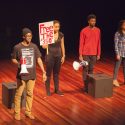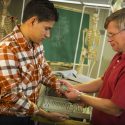Students compete to promote NASA
From creating a space-based reality show called "NASA’s Next" to assisting local organic farmers, the University of Wisconsin–Madison’s NASA Means Business team has a slew of ideas about how to promote NASA, leaving the spaceflight agency over the moon.
As part of a national collegiate competition, the team has developed a NASA Spaceflight Promotion Plan designed to market everything from NASA’s well-known International Space Station to its lesser-known programs, such as research into organic foods. The team was one of four teams selected to move on to the final round this semester.
The team is currently implementing some of its suggestions on campus, trying to connect campus researchers with NASA’s resources and branding the NASA name to students. In May, the team will travel to the Kennedy Space Center to present their final proposal at the 10th annual NASA Customer Engagement Conference.
In June, NASA will choose the winning team and fly the winners to Washington, D.C., to present their proposal officially to NASA.
Team leader Nick Remshak talks about his experience with the competition and its recent success.
Q: What is the NASA Means Business Competition?
A: "Basically the task was to promote NASA spaceflight and their capabilities to corporate researchers, to researchers on campus and to independent businesses. It is a very broad task: Take what you know about NASA and make it applicable to these different groups of people. No one on the team had any background information about what NASA does. Obviously NASA has the space shuttle and the international space system, but it is also a research facility that works on all kinds of stuff. So we tried to think of how to connect NASA with these researchers and also how to build a better relationship with these researchers."
Q: What is unique about this NASA competition?
A: "What is really unique about NASA is it is not a hypothetical situation like a lot of competitions are. This is actually ‘We want you to give us ideas, and how can we implement your ideas to make us a better organization.’"
Q: Why did you decided to participate in the competition?
A: "I get to work with different people who give you a different perspective and different ideas. Besides that, I get to challenge myself outside the classroom. Instead of just reading a textbook, I can be creative. "
Q: Are all the students business majors?
A: "No. We have a pretty diverse team. There are people not just strictly from business. I think that is what NASA is looking for. They don’t just want people from one major. They want people from different backgrounds because obviously you get a different perspectives and ideas. The group is very informal. What we did was brainstorm ideas as a group. Then we took those ideas and the team split up to do different aspects of the project."
Q: What are the challenges you have faced during the competition?
A: "The biggest challenge is we have never done this before. We are starting from scratch. With anything that you start from fresh without any background knowledge, we really didn’t know what to expect. Some of the teams that we are competing against have competed for a number of years so they have some experience and they know that they are doing. We didn’t have that so we just went with it. We said ‘Hey, these are good ideas,’ and we just went with it. "
Q: Considering this is your first year, are you happy with the results?
A: "We are happy that our effort paid off. We were surprised. With any type of competition you think the people who have been in it before have a definite advantage so we thought we would have to do if for a couple of years before we moved on to the finals. So we were very happy, surprised and pleased."
Tags: business, events, learning, student life



